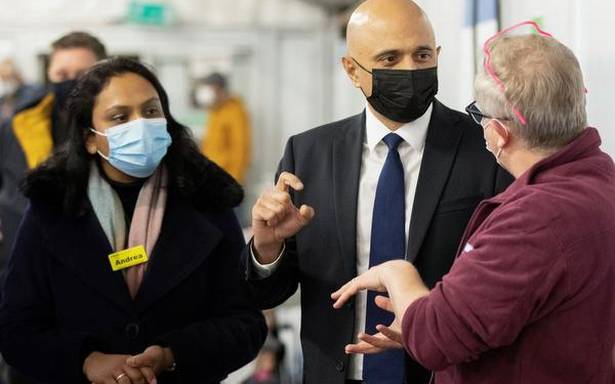The Omicron variant, first identified in southern Africa, is feared to have higher re-infection risk and its potential vaccine resistance due to a large number of spike proteins remains under study
Face coverings are mandatory in shops and public transport from November 30 as part of “targeted measures” to slow the spread of the Omicron variant, 14 cases of which have now been detected in the U.K. after Scotland reported three new infections.
The enhanced measures, announced last week as a precaution while more information is gathered and assessed on the new variant’s transmissibility and any possible effect on current COVID-19 vaccines, also include compulsory PCR tests on arrival for all international travellers as well as a so-called boosted booster vaccination programme to cover all adults aged over 18.
The Omicron variant, first identified in southern Africa, is feared to have higher re-infection risk and its potential vaccine resistance due to a large number of spike proteins remains under study.
“The measures taking effect today are proportionate and responsible, and will buy us time in the face of this new variant,” British Prime Minister Boris Johnson said.
“Based on everything we know, our vaccines and boosters remain our best line of defence, so it is more important than ever that people come forward when eligible to get boosted. Not only will today’s steps help us slow down the variant’s spread, but they will help us protect each other and the gains we have all worked so hard for,” he said.
Starting Tuesday, face coverings will be a legal requirement in shops and settings such as banks, post offices and hairdressers, as well as on public transport unless individuals are exempt from doing so.
All international arrivals must take a PCR test by the end of the second day after arrival and self-isolate until they receive a negative result. Also, all contacts of suspected Omicron cases must self-isolate, regardless of their age or vaccination status. They will be contacted by the National Health Service (NHS) Test and Trace system. Downing Street stressed that these measures are temporary and precautionary, and will be reviewed in three weeks.
On Monday, the Joint Committee on Vaccination and Immunisation (JCVI) advised the booster programme was extended to all 18-39 year-olds and the gap between the second dose and booster was reduced to three months.
All those aged 12 to 15 years have now been advised to receive a second dose of the Pfizer/BioNTech COVID-19 vaccine, no sooner than 12 weeks after the first dose. Severely immunosuppressed individuals who have received three primary doses, should now also be offered a fourth booster dose.
U.K. Health Secretary Sajid Javid told the House of Commons soon after that the government has accepted the advice and implementation details will be laid out further, which could include more local pharmacies being used as part of the NHS vaccine rollout.
Meanwhile, South Africa, Botswana, Lesotho, Eswatini, Zimbabwe, Namibia, Malawi, Mozambique, Zambia, and Angola remain on the U.K.’s travel ban red list and surge PCR testing and enhanced contact tracing is underway where cases have been identified.
The U.K. Health Security Agency (UKHSA) is carrying out targeted testing at locations where the positive cases were likely to have been infectious. Confirmed cases and contacts are being followed up and asked to isolate and get tested as necessary.
The Omicron variant contains a large number of spike protein mutations as well as mutations in other parts of the viral genome, with early indications suggesting this variant may be more transmissible.
“The measures will give us time to slow down the spread of the variant as work continues internationally to fully understand how these mutations may change the behaviour of the virus with regards to vaccines, treatments and transmissibility,” Downing Street said.
“The vaccination programme and test, trace and isolate system continue to be the most effective way of reducing transmission, along with practicing good hygiene, keeping spaces well ventilated, and wearing masks,” it added.
It comes as the U.K.’s official daily coronavirus infections tally remains high but the corresponding deaths and hospitalisations with severe disease continues to fall — with 42,583 infections and 35 COVID deaths recorded on Monday.
Source: Read Full Article

